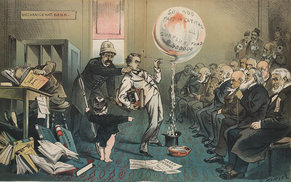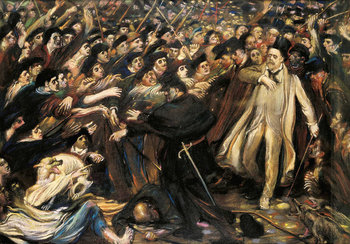
Malicious Compliance
Malicious compliance is the act of using an organization's own processes and rules against it. For example, a government employee who disagrees with the actions of that government who uses processes and rules to slow the government down. This could include tactics such as invoking obscure security procedures, quality controls or audits that are detrimental to efficiency.Work-to-Rule
Malicious compliance orchestrated by organized labor to bring business to a halt as a negotiating tactic.Abuse of Process
Using the legal system to cause an adversary trouble. For example, suing a neighbor to force them to tear down a fence when you find the fence visually appealing but dislike the neighbor.Forum Shopping
Filling legal cases in a jurisdiction that is more likely to provide a favorable judgment. For example, a parent in an international marriage who files for divorce in their home country because that country is more likely to grant custody to them than a foreigner.Malicious Prosecution
The wrongful initiation of criminal proceedings driven by some ulterior purpose or motive. For example, a politician who launches politically motivated criminal proceedings against an adversary.Revenue Over-optimization
Changing your processes and practices in a negative way that produces less value but more revenue. For example, shaping medical treatment to the payment system of a government or insurance company. If consultations are paid at an unattractive rate but x-rays are profitable a physician may keep consultations short and order more x-rays than is reasonable or advisable.Behavior Over-optimization
Viewing a process that is meant to be honest and authentic as a game that can be optimized with practice. For example, patients who use sessions with different psychiatrists to become a better neurotic by learning what psychiatrists look for to diagnosis a condition. This may be motivated by a desire to escape certain responsibilities, obtain benefits or gain attention.Passive Aggression
Indirect resistance or attacks that avoid a direct confrontation. For example, an employee who regularly insults coworkers without technically saying anything that could be considered inappropriate.Grinding
Grinding is a strategy in gaming whereby you repeat an easy action many times to build up points, power, abilities or status. For example, a player who collects some coins, waits for them to regenerate and collects them again for three days straight to move up in status in a game world.Campbell's Law
Campbell's Law is the tendency of social measurements to corrupt social systems. For example, a standardized test is introduced to measure education systems and the abilities of students. Students want to pass the test and schools are put under pressure to help them. The result is that the education system aligns itself to passing the test and drops anything unrelated to the test. In other words, schools and students destroy their education in a rush to game the system by finding the most efficient way to improve their test scores.Be Careful What You Measure
Be careful what you measure is a business principle that is applied to goal setting and the use of business metrics. Firms often adopt a policy that all objectives in an organization need to be measurable i.e. SMART objectives. This leads to unintended consequences as organizations, departments, teams and individuals develop measurements and then focus on improving these measurements over anything that isn't measured. For example, a salesperson who is measured on revenue from closed deals may neglect customer service issues leading to brand damage. This can occur when a salesperson is friendly until a deal is signed and then becomes a completely different person who is unresponsive to any type of request from the customer the moment the revenue is secured.Perverse Incentives
Perverse incentives are rewards in a system that encourage bad behavior. For example, an economic system that rewards the production of economic goods but has no penalty for the production of economic bads.Revolving Door
A system where regulators are easy on business in exchange for lucrative jobs after several years in government. This exists as an unspoken rule in some countries such that nobody talks about it or writes any contracts to avoid breaking any actual rules. In some cases, an individual will go back and forth between government positions and industry positions throughout their career to be continually rewarded for light regulation. This is a type of regulatory capture.Creative Accounting
Aggressive use of rules and legal structures to reduce taxes or to inflate earnings results presented to investors. Such approaches may follow rules strictly while at the same time violating the spirit and intent of the rules.Filibuster
A political tactic that involves extending the length of a procedure such as a debate to an extreme length in order to obstruct the passage of a law or some other action of government.Gamesmanship
Gamesmanship is the use of a dubious but legal tactic to win a game, series or championship. It is the opposite of sportsmanship. For example, soccer players who pretend to have an injury to run down a clock when they are ahead by a goal. The player may indeed have a minor pain but would play normally if the score were the reverse.Legal Technicality
Following the letter of the law but not its spirit. For example, pachinko parlors in Japan operate as "entertainment facilities" as gambling is not permitted under the law with a few exceptions. Inside the pachinko you can win tokens that are worthless in the pachinko parlor itself. However, outside each pachinko establishment is a small shop that just happens to have a fondness for these tokens and pays cash for them.| Overview: Gaming The System | ||
Type | ||
Definition | To go against the purpose and spirit of a system while technically staying within the rules. | |
Related Concepts | ||

































